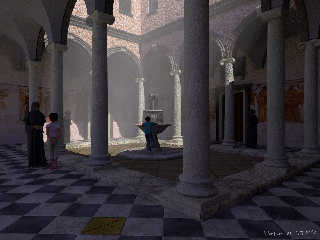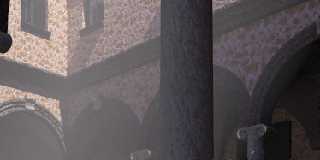 |
 |
|
 |
|
 |
|  |
|  |
|
 |
|
 |
|  |
|  |
|
 |
Never being satisfied, I made some last changes: I added an extra
pigment_pattern normal to the tiled floor /and/ I rendered with
stochastic antialiasing (render time: 9.5 hours). I believe this subtly
improved the scene.
Now I have a question for Clipka!
*Why* is the light source moved when rendered with UberPOV???? See the
small cut-out from a render with POV-Ray 3.7 and compare. Also the
fountain is more lighted using UberPOV...
Using /exactly/ the same scene code.
Thomas
Post a reply to this message
Attachments:
Download 'silentium_final2.jpg' (259 KB)
Download 'silentium_partial.png' (111 KB)
Preview of image 'silentium_final2.jpg'

Preview of image 'silentium_partial.png'

|
 |
|  |
|  |
|
 |
|
 |
|  |
|  |
|
 |
On 23/09/2014 09:00, Thomas de Groot wrote:
> Never being satisfied, I made some last changes: I added an extra
> pigment_pattern normal to the tiled floor /and/ I rendered with
> stochastic antialiasing (render time: 9.5 hours). I believe this subtly
> improved the scene.
I like this one very much.
--
Regards
Stephen
Post a reply to this message
|
 |
|  |
|  |
|
 |
|
 |
|  |
|  |
|
 |
Am 23.09.2014 10:00, schrieb Thomas de Groot:
> Now I have a question for Clipka!
> *Why* is the light source moved when rendered with UberPOV???? See the
> small cut-out from a render with POV-Ray 3.7 and compare. Also the
> fountain is more lighted using UberPOV...
Frankly, I don't have the slightest idea. (*)
You mind posting the relevant portions of the scene? (light source, plus
either the architecture or some information about the dimension thereof?)
(* Well, that's not entirely true; my best bet would be that you're
using area lights and that my stochastic area light handling code is
buggy; but that would most likely cause a sideways offset of the light
source. To me the difference in the images looks more like the light
source is closer to the origin - or as if the POV-Ray 3.7 version used a
parallel light source where the UberPOV version used a point light source.)
Post a reply to this message
|
 |
|  |
|  |
|
 |
|
 |
|  |
|  |
|
 |
Am 23.09.2014 13:10, schrieb clipka:
> Am 23.09.2014 10:00, schrieb Thomas de Groot:
>
>> Now I have a question for Clipka!
>> *Why* is the light source moved when rendered with UberPOV???? See the
>> small cut-out from a render with POV-Ray 3.7 and compare. Also the
>> fountain is more lighted using UberPOV...
>
> Frankly, I don't have the slightest idea. (*)
Well, now I do have some that's far from slight; see this thread:
news://news.povray.org:119/web.54214e42b2c0e8b8b6820d7a0@news.povray.org
If you examine the shadows in your scene closely, it hits you like a
hammer (well, at least that's how it hit me): The light source hasn't
budged an inch - it's the shadows of your pillars, arches and ledges
that have vanished /entirely/!
Oh bugger.
Could you do me a favor and post the respective material definitions?
Thanks a lot!
Post a reply to this message
|
 |
|  |
|  |
|
 |
|
 |
|  |
|  |
|
 |
On 23-9-2014 13:10, clipka wrote:
> Am 23.09.2014 10:00, schrieb Thomas de Groot:
>
>> Now I have a question for Clipka!
>> *Why* is the light source moved when rendered with UberPOV???? See the
>> small cut-out from a render with POV-Ray 3.7 and compare. Also the
>> fountain is more lighted using UberPOV...
>
> Frankly, I don't have the slightest idea. (*)
>
> You mind posting the relevant portions of the scene? (light source, plus
> either the architecture or some information about the dimension thereof?)
>
> (* Well, that's not entirely true; my best bet would be that you're
> using area lights and that my stochastic area light handling code is
> buggy; but that would most likely cause a sideways offset of the light
> source. To me the difference in the images looks more like the light
> source is closer to the origin - or as if the POV-Ray 3.7 version used a
> parallel light source where the UberPOV version used a point light source.)
>
No area light is used here (I have it available but is not used in this
scene). Light info is:
#declare Sun_alt = 50;
#declare Sun_azm = -80;
#include "CIE.inc"
#declare SunColor = Blackbody(6500)*2;
#declare SunPosition = <0, 0, -2>*10e4;
#declare SunPosition = vrotate(SunPosition, <Sun_alt, Sun_azm, 0>);
light_source {
<0, 0, 0>
color rgb SunColor
translate SunPosition
parallel
point_at <0, 0, 0>
}
I am trying to get a simplified version of the cloister (only bounding
boxes from Poseray) and put it here as soon as I have made it work...
Thomas
Post a reply to this message
|
 |
|  |
|  |
|
 |
|
 |
|  |
|  |
|
 |
On 23-9-2014 14:00, clipka wrote:
> Am 23.09.2014 13:10, schrieb clipka:
>> Frankly, I don't have the slightest idea. (*)
>
> Well, now I do have some that's far from slight; see this thread:
>
> news://news.povray.org:119/web.54214e42b2c0e8b8b6820d7a0@news.povray.org
>
> If you examine the shadows in your scene closely, it hits you like a
> hammer (well, at least that's how it hit me): The light source hasn't
> budged an inch - it's the shadows of your pillars, arches and ledges
> that have vanished /entirely/!
>
> Oh bugger.
>
> Could you do me a favor and post the respective material definitions?
> Thanks a lot!
>
Oh gosh, yes, it is a shadow vanishing trick indeed!
I attach the material file of the building. Note that a few elements
have been subjected to a proximity pattern. I shall test if /those/
render differently; if so, you will get them too but I think that will
not be necessary.
Thomas
Post a reply to this message
Attachments:
Download 'cloister_pievedicadore_pov_mat.inc.txt' (33 KB)
|
 |
|  |
|  |
|
 |
|
 |
|  |
|  |
|
 |
Le 23/09/2014 10:00, Thomas de Groot a écrit :
> Never being satisfied, I made some last changes: I added an extra
> pigment_pattern normal to the tiled floor /and/ I rendered with
> stochastic antialiasing (render time: 9.5 hours). I believe this subtly
> improved the scene.
>
> Now I have a question for Clipka!
> *Why* is the light source moved when rendered with UberPOV???? See the
> small cut-out from a render with POV-Ray 3.7 and compare. Also the
> fountain is more lighted using UberPOV...
>
> Using /exactly/ the same scene code.
>
> Thomas
Well done, you have made some very good jobs actually. I want also to
thank and congratulate you for your reeds_in_the_winds files, very
useful and realistic.
Lionel
--
Do not judge my words, judge my actions.
---
Ce courrier électronique ne contient aucun virus ou logiciel malveillant parce que la
protection avast! Antivirus est active.
http://www.avast.com
Post a reply to this message
|
 |
|  |
|  |
|
 |
|
 |
|  |
|  |
|
 |
On 23-9-2014 16:20, Thomas de Groot wrote:
> Oh gosh, yes, it is a shadow vanishing trick indeed!
>
> I attach the material file of the building. Note that a few elements
> have been subjected to a proximity pattern. I shall test if /those/
> render differently; if so, you will get them too but I think that will
> not be necessary.
Well, I can now say definitively that the culprits are the elements that
have gone through the proximity pattern mill. However, the strange thing
is that the shadow of the window sill on the first floor also vanishes
although no element with a proximity pattern is present there.
So the problem might be slightly different from what you were fearing.
Info:
- I used Edouard Poor's Proximity Pattern macro.
- You may have them one way or another, but I attach Edouard's files, as
I use them, to be sure.
- The arcs, columns, and the fountain are processed.
- I attach de .df3 and .prox files of these elements.
I think you have everything necessary to test. If not, yell.
Thomas
Post a reply to this message
Attachments:
Download 'arcs.df3.dat' (82 KB)
Download 'windows-1252' (1 KB)
Download 'columns.df3.dat' (83 KB)
Download 'windows-1252' (1 KB)
Download 'fountain.df3.dat' (79 KB)
Download 'windows-1252' (1 KB)
Download 'windows-1252' (15 KB)
Download 'windows-1252' (13 KB)
|
 |
|  |
|  |
|
 |
|
 |
|  |
|  |
|
 |
On 23-9-2014 16:46, FractRacer wrote:
> Well done, you have made some very good jobs actually. I want also to
> thank and congratulate you for your reeds_in_the_winds files, very
> useful and realistic.
Thank you indeed. The pleasure is mine :-)
As far as the reeds are concerned, I guess there are possibilities for
improvement. This is about what I can do, others may come up with some
smart solutions.
Thomas
Post a reply to this message
|
 |
|  |
|  |
|
 |
|
 |
|  |
|  |
|
 |
Am 23.09.2014 16:44, schrieb Thomas de Groot:
> On 23-9-2014 16:20, Thomas de Groot wrote:
>> Oh gosh, yes, it is a shadow vanishing trick indeed!
>>
>> I attach the material file of the building. Note that a few elements
>> have been subjected to a proximity pattern. I shall test if /those/
>> render differently; if so, you will get them too but I think that will
>> not be necessary.
>
> Well, I can now say definitively that the culprits are the elements that
> have gone through the proximity pattern mill. However, the strange thing
> is that the shadow of the window sill on the first floor also vanishes
> although no element with a proximity pattern is present there.
Can you help me with identifying those textures?
> So the problem might be slightly different from what you were fearing.
Well, what /was/ I "fearing" then? ;-)
I have no doubt that the Prox Pattern macros are perfectly fine. I
presume that they just happen to make use of a language construct that's
broken, which may also be used in (and therefore affect) other materials.
Say, do the vanished non-proxed objects perchance also make use of a
texture_map?
Post a reply to this message
|
 |
|  |
|  |
|
 |
|
 |
|  |




![]()